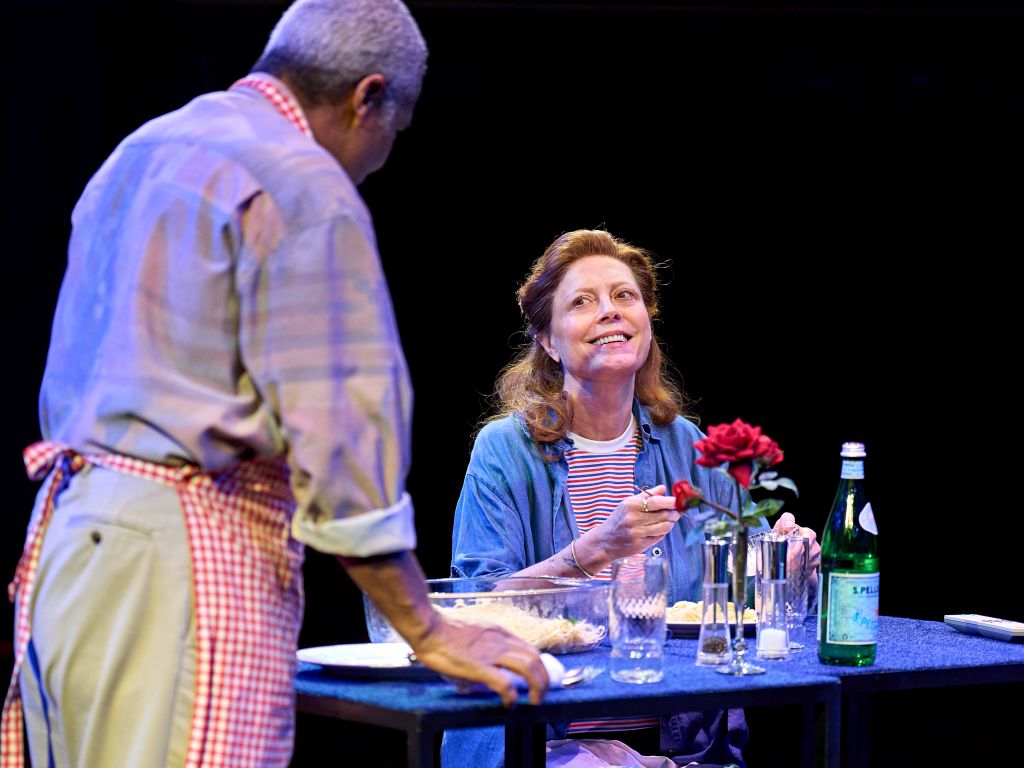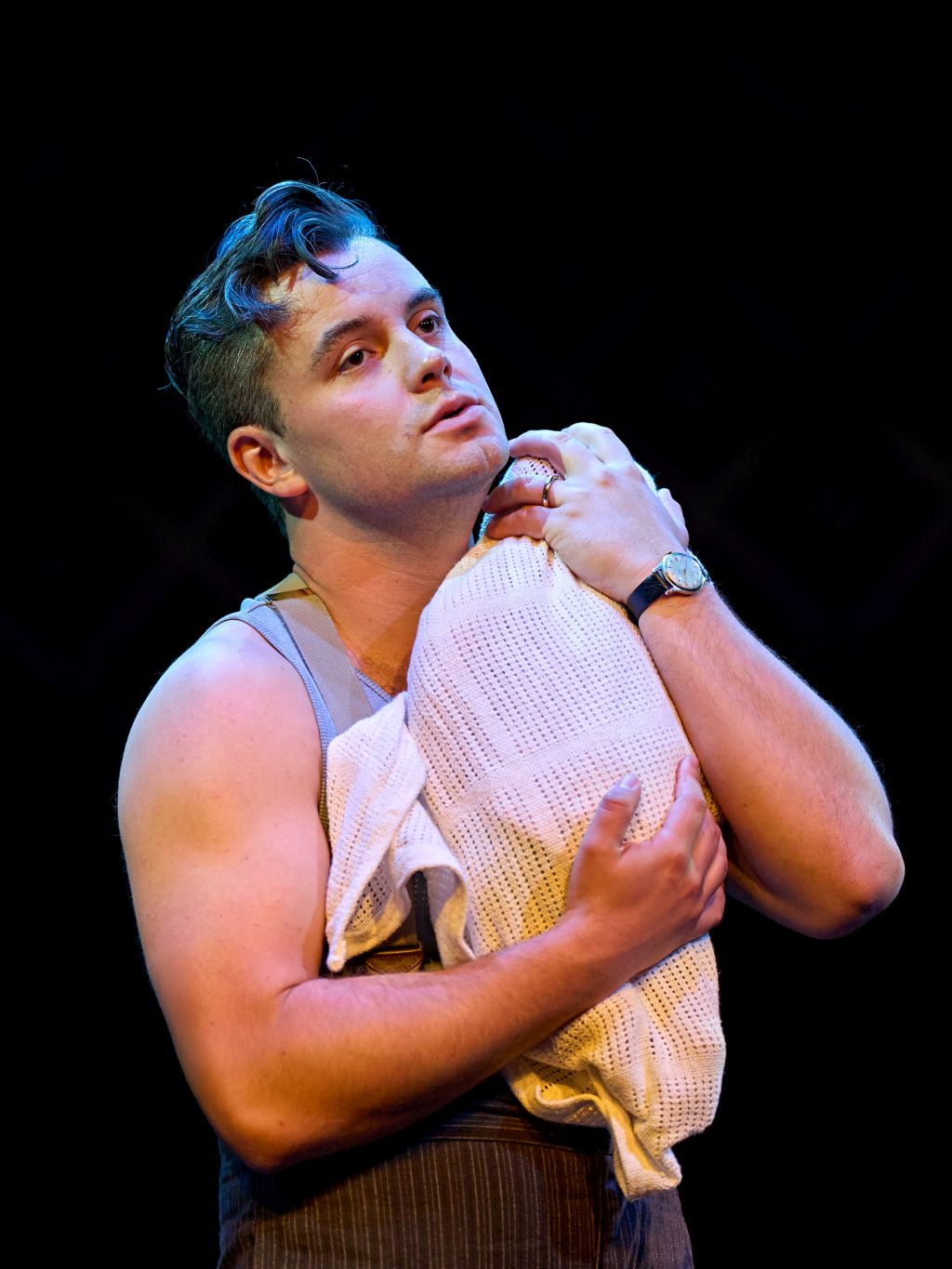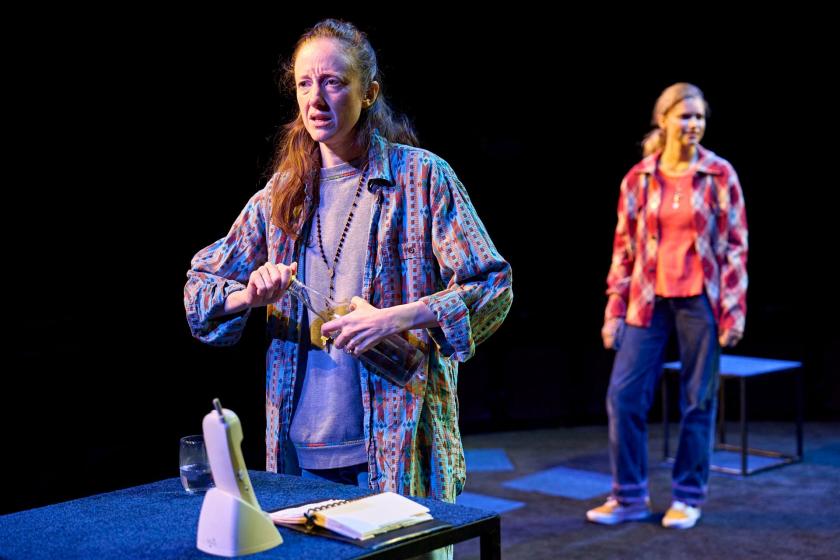I came late to the Old Vic's shimmering production of Mary Page Marlowe, Tracy Letts's Off Broadway play from 2018 which has arrived in London with Andrea Riseborough and Susan Sarandon leading a sizable and uniformly excellent cast. And I hope theatregoers will catch this too-short run while they can. Amidst ongoing chat – sometimes justified – about screen stars not being able to hold their own stage, Matthew Warchus's keenly attuned staging proves that just as often they very much can.
Sarandon (pictured below with Hugh Quarshie), the Oscar winner an agelessly commanding 79, has done theatre sparingly, to be fair: I've only seen her on the New York stage twice in the last 40 years. But she lends both gravitas and warmth to the eldest of the five versions of the Ohio accountant of the title whom Letts places on view before us, each of her three scenes an adroitly managed playlet of its own. Add to the mix the UK's own Riseborough, who has become an Oscar nominee (in 2023, for To Leslie) in the years since she last appeared on a local stage, and you have two first-rate actresses steering this ingeniously constructed theatrical ship. Its 11 scenes, presented out of chronological order, can be seen as Letts's attempt to answer the question – best put, as ever, by Shakespeare – informing all our lives: "Who is is who can tell me who I am?" This short, exceedingly smart evening demands that we bring into focus the fragments of its title character's difficult life in whatever way we can: human behaviour is an ever-slippery beast which Mary Page Marlowe as a play doesn't so much tame as give us teasing moments to ponder. The abiding visual metaphor is a patchwork quilt, the assemblage of which also marks the only time the five Mary Pages, ranging in age from 12 to 69, converge as one.
Its 11 scenes, presented out of chronological order, can be seen as Letts's attempt to answer the question – best put, as ever, by Shakespeare – informing all our lives: "Who is is who can tell me who I am?" This short, exceedingly smart evening demands that we bring into focus the fragments of its title character's difficult life in whatever way we can: human behaviour is an ever-slippery beast which Mary Page Marlowe as a play doesn't so much tame as give us teasing moments to ponder. The abiding visual metaphor is a patchwork quilt, the assemblage of which also marks the only time the five Mary Pages, ranging in age from 12 to 69, converge as one.
As with the concurrent The Unbelievers at the Royal Court, this is a puzzle play that audiences are required to piece together, and those who demand linearity may feel frustrated from the start. Others will relish a jagged, splintered approach that allows connections suddenly to land with unbidden force. In the fourth scene, for instance, we see the infant Mary in the company of her volatile parents, her kindly father Ed (Noah Weatherby, pictured below right) singing to his baby girl by way of balm. So it comes as a real blow five scenes later when 12-year-old Mary (Alisha Weir) is singing for her hard-bitten, heavy-drinking mother (Eden Epstein), who refuses to acknowledge her young daughter's gifts. Parents can be casually cruel in ways that linger a lifetime.
 Their less salutary habits, too, can be passed on. We watch as Mary Page turns to alcohol as her mother did before her, Mary Page also relocating her own family just a she was herself relocated early on. "The world is a mean old place," we're informed, and a sad-eyed Riseborough, in particular, communicates that blunt assertion with quietly rending power, the fragmentary structure of the play its own best defense against overstatement: such observations , much like the scenes that contain them, move swiftly on.
Their less salutary habits, too, can be passed on. We watch as Mary Page turns to alcohol as her mother did before her, Mary Page also relocating her own family just a she was herself relocated early on. "The world is a mean old place," we're informed, and a sad-eyed Riseborough, in particular, communicates that blunt assertion with quietly rending power, the fragmentary structure of the play its own best defense against overstatement: such observations , much like the scenes that contain them, move swiftly on.
We see Mary age for a while shedding her middle name, not to mention in conversation with a shrink (Lauren Ward, like many in the cast an alum of director Warchus's scintillating stage and screen Matilda). And the play in its own way casts the audience as analyst, as we find connections perhaps unavailable in the moment to Mary Page herself: there's a lovely scene, for instance, late on when Sarandon's MPM in the final scene strikes up a rapport with Ben (Gilbert Kyem Jnr), a kindly employee at the dry cleaners. The younger man clearly reminds the ageing Mary Page of her warmly supportive husband Andy (a gentle Hugh Quarshie) who by that point has passed on.
Not every man in Mary Page's life is so supportive. Paul Thornley makes hay of his appearance as the explosive Ray come the seventh scene, which returns us to Riseborough, her arm at that point in a sling. Elsewhere, we clock a fling with her boss (Ronan Raftery), who has been married 11 years and whose father was a workmate of Mary Page's own.
Men have a way of vanishing from Mary Page's life – a truism that extends to her own son. Throughout it all, Rob Howell's circular set bustles with activity as each vignette gives way to the next, the agglomeration of incident gatheringly revelatory about this single, multi-faceted person's life. (The seating configuration in the round seems right for a play that sees Mary Page in the round.) And as if paying explicit homage to King Lear, Letts allows Ward's therapist to sear the air with the simple question to her patient, "Who are you?"
And to that query, there can be no one, simple answer. Life, this lovely play knows full well, doesn't work like that.















Add comment